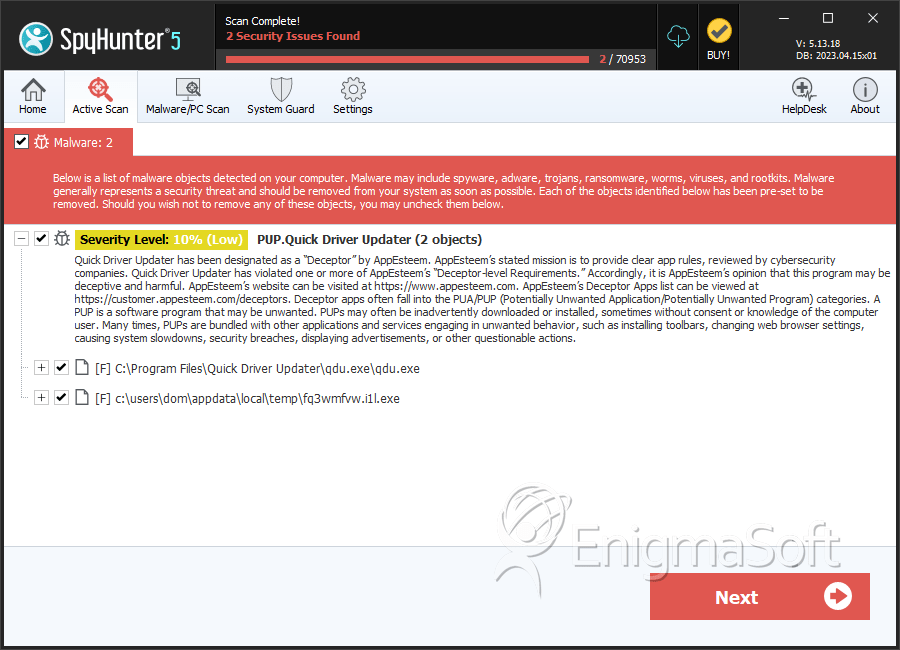Quick Driver Updater
The Quick Driver Updater is a Potentially Unwanted Program (PUP) that claims to scan a user's computer for outdated drivers and offers updated drivers for the detected components. However, this program uses deceptive tactics, including intentional fake positives, to convince users to purchase the premium version of the program. As a result, it has been classified as a PUP and a rogue optimization tool.
When the Quick Driver Updater detects an outdated driver, it presents it as a critical issue, even if using an older driver will not cause any problems. This creates a sense of urgency and panic, urging the user to update the driver immediately. The program then asks the user to purchase a license to update the driver, despite the fact that the user may not actually need the update.
By using these misleading tactics, the Quick Driver Updater is able to convince users to purchase the premium version of the program, which may not provide any real benefit to the user's computer. This can result in users spending money unnecessarily and potentially compromising the security and performance of their devices.
Table of Contents
Getting Rid of PPIs could be Tedious
Having a PPI like the Quick Driver Updater may significantly reduce the efficiency of a user's computer system. Once installed, the application will make various customizations to the system parameters in order to establish persistence. For example, it may enable itself to self-start immediately with every system startup. This could make manually removing the unwanted item a time-consuming process. Users also risk failing to completely remove all remnants of the program from the system. As a result, some PUPs may be able to restore themselves even after being removed from the Control Panel.
Therefore, it is recommended that users scan their system with a trustworthy anti-malware tool to completely eliminate any remnants of the Quick Driver Updater program. This will help ensure that the system is fully cleaned and that the user can resume normal activities on their computer without any further interruptions or performance issues.
PPIs Often Rely on Questionable Distribution Tactics
PPIs often rely on dubious or shady tactics for their distribution. These tactics include the use of deceptive and misleading advertising, bundling with legitimate software downloads, and exploiting security vulnerabilities in the user's system.
PPsI are often advertised using misleading and exaggerated claims of their functionality, such as promising to optimize or speed up the user's system. The ads may appear as pop-ups, banners, or sponsored links, and they often encourage the user to click on them and download the program.
Another tactic is bundling PPIs with legitimate software downloads. This is often done by third-party download sites that offer free software downloads. The PPI may be included in the bundle without the user's consent or knowledg and it may install itself alongside the intended software. In some cases, the user may even be forced to accept the PPI's installation as part of the download process.
Overall, PPIs rely on deceptive and manipulative tactics to infiltrate a user's system and can cause a range of issues, including system slowdowns, security vulnerabilities, and privacy concerns. Users should be cautious when downloading software from unknown sources and should always carefully read through the terms and conditions before installing any software onto their system
.
SpyHunter Detects & Remove Quick Driver Updater


